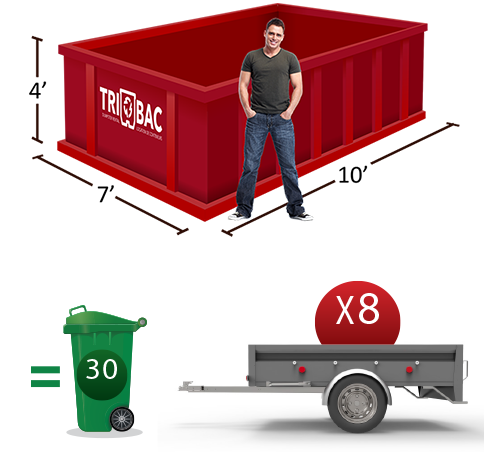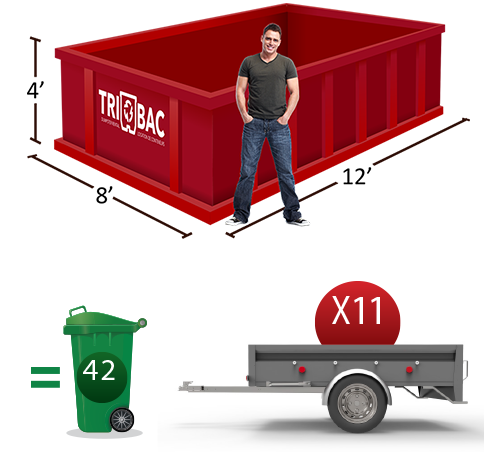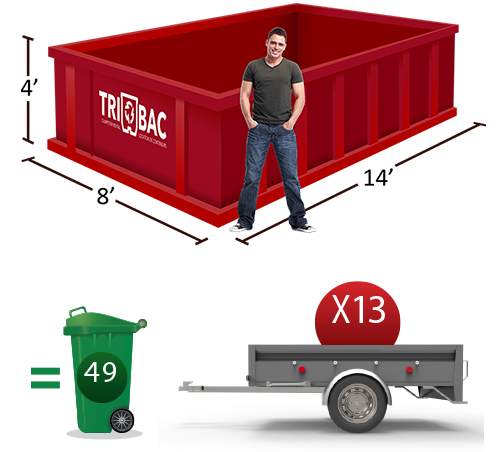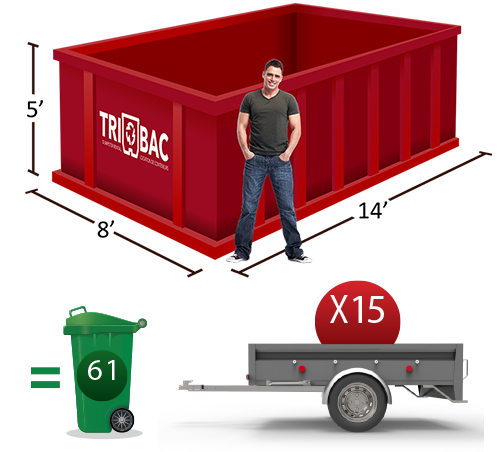DUMPSTERS TO MANAGE YOUR WASTE ECOLOGICALLY!

TODAY’S SOCIETY HAS A MUCH GREENER CONSCIENCE, AND SO DO WE!
WASTE AS VALUE: A NEW ENVIRONMENTAL ATTITUDE
- Treated and untreated wood
- Rock, concrete and brick
- Gypsum
- PVC
- Ceramics/Porcelain
- Compostable waste (earth, branches, leaves, etc.)
WHAT IS REQUIRED IN ORDER TO ACHIEVE OPTIMAL RECYCLING
And now you can play your part. When your dumpster is delivered to the collection point, the first step is up to you. With respect to the waste you will produce, there is a certain logical order and criteria to be respected. Obviously, the heaviest articles should go into the bottom of the dumpster to facilitate transportation and keep the load balanced. Materials with the largest metric volume should also go in the bottom, so you can optimize the space used. For the rest, you should avoid adding any waste that will be refused by the recycling centre, such as car tyres, with or without rims, propane cylinders and electronic equipment. All of these items are subject to specialized recycling. You will find most of the answers to these and other questions in our FAQ. Don’t forget that we take the type of waste you are producing into account, since there are additional fees for excess weight and materials that do not comply with recycling rules or whose recycling is regulated (tyre tax for recovering tyres, rules for recycling asbestos, others for electronic equipment).
We are proud to participate along with you in this environmental consciousness so that we may do everything in our power to make life easier when it comes to managing your waste.
Dumptser equivalence
Servicing the following cities and regions
Ahuntsic/Cartierville
Anjou
Beaconsfield/Baie-D’Urfé
Bellefeuille
Boucherville
Chambly
Côte-des-Neiges/Notre-Dame-de-Grace
Côte-Saint-Luc/Hampstead
Dollard-des-Ormeaux/Roxboro
Dorval
Greenfield Park
Kirkland
Île-des-Soeurs
Île Perrot
L’Île Bizard
La Plaine
Le Gardeur
Lachine
LaSalle
Laval
Mascouche
Mercier/Hochelaga/Maisonneuve
Mirabel
Mont-Royal
Montréal-Est
Montréal-Nord
Outremont
Pierrefonds
Pincourt
Plateau – Mont-Royal
Pointe-aux-Trembles/Rivières-des-Prairies
Pointe-Claire
Rosemont/La Petite Patrie
Saint-Amable
Saint-Basile-le-Grand
Saint-Constant
Saint-Jérome
Saint-Joseph-du-Lac
Saint-Laurent
Saint-Lazare
Saint-Léonard
Sainte-Catherine
Sainte-Geneviève/Sainte-Anne-de-Bellevue
Sainte-Julie
Senneville
Sud-Ouest
Terrebonne
Varennes
Vaudreuil-Dorion
Verdun
Ville-Marie
Villeray/Saint-Michel/Parc-Extension
Westmount





